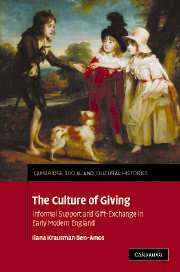Book contents
- Frontmatter
- Contents
- List of illustrations
- List of tables
- Acknowledgements
- List of abbreviations
- Introduction
- Part I Social spaces and reciprocities
- Part II The economy of giving
- 5 Cultivating the obligation to give
- 6 Honour and reputation
- 7 Discourses of giving
- 8 The perils of gifts
- Part III The state, markets and gifts
- Conclusion
- Bibliography
- Index
5 - Cultivating the obligation to give
Published online by Cambridge University Press: 04 May 2010
- Frontmatter
- Contents
- List of illustrations
- List of tables
- Acknowledgements
- List of abbreviations
- Introduction
- Part I Social spaces and reciprocities
- Part II The economy of giving
- 5 Cultivating the obligation to give
- 6 Honour and reputation
- 7 Discourses of giving
- 8 The perils of gifts
- Part III The state, markets and gifts
- Conclusion
- Bibliography
- Index
Summary
Previous chapters have indicated that personal transactions and reciprocal exchanges were intrinsic to the flow of informal support throughout the period. In this respect, all types of support we have discussed shared features and carried the kind of social implications commonly associated with ‘gifts’. In other words, what appeared to be a unilateral sacrifice of resources whereby individuals freely distributed possessions and other resources was upheld by social interactions and dynamics of interchange that compelled the participants to engage in the provision of support. This does not imply that a strict ‘cost and benefit’ calculus shaped informal help, nor that a single incentive or a specific set of interactions structured all practices. We have indeed identified variegated exchanges; generous but unequal transfers in families, more equal reciprocities based on the indispensability of trust among kin and other networks, asymmetrical exchanges built into patron–client but also other interactions, exchanges and reciprocities enforced by personal exchange and trust but also by institutional mechanisms of control in the form of governing bodies of parishes, guilds and associations. Often the reciprocities overlapped – asymmetrical relations penetrated ties built on trust, and trust infiltrated relations shaped by submission and social distance. While some interactions were sustained over many years, others endured for a shorter time span and flowed through intermediaries rather than in face-to-face encounters.
- Type
- Chapter
- Information
- The Culture of GivingInformal Support and Gift-Exchange in Early Modern England, pp. 145 - 194Publisher: Cambridge University PressPrint publication year: 2008



